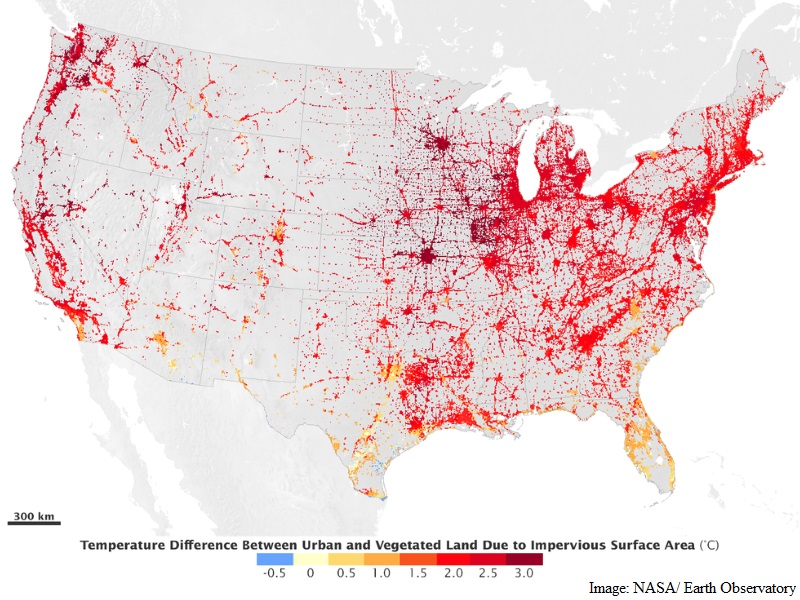- Home
- Science
- Science News
- Nasa Says Grow Plants If You Want to Curb Urban Heat
Nasa Says Grow Plants If You Want to Curb Urban Heat

Using multiple satellites' observations, researchers found that areas in the US covered in part by concrete surfaces had a summer temperature 1.9 degrees Celsius higher than surrounding rural areas.
In winter, the temperature difference was 1.5 degrees Celsius higher in urban areas.
At the human level, a rise of one degrees Celsius can raise energy demands for air conditioning in the summer from five to 20 percent.
"This has nothing to do with greenhouse gas emissions. It is in addition to the greenhouse gas effect. This is the land use component only," said Lahouari Bounoua, research scientist at Nasa's Goddard Space Flight Centre in Greenbelt, Maryland.
The urban heat island effect occurs primarily during the day when urban impervious surfaces absorb more solar radiation than the surrounding vegetated areas, resulting in a few degrees temperature difference.
The urban area has also lost the trees and vegetation that naturally cool the air.
"Anywhere in the US, small cities generate less heat than mega-cities," Bounoua said.
The reason is the effect vegetation has on keeping a lid on rising temperatures.
"The amount and type of vegetation plays a big role in how much the urbanisation changes the temperature," added research scientist and co-author Kurtis Thome.
As a by-product of photosynthesis, leaves release water back into to the atmosphere in a process called evapotranspiration, which cools the local surface temperature the same way that sweat evaporating off a person's skin cools them off.
Trees with broad leaves have more pores to exchange water than trees with needles, and so have more of a cooling effect.
"So even though 0.3 degrees Celcius may seem like a small difference, it still may have impact on energy use," Bounoua said, especially when urban heat island effects are exacerbated by global temperature rises due to climate change.
Understanding the tradeoffs between urban surfaces and vegetation may help city planners in the future mitigate some of the heating effects, the authors noted in a paper that appeared in the journal Environmental Research Letters.
For the latest tech news and reviews, follow Gadgets 360 on X, Facebook, WhatsApp, Threads and Google News. For the latest videos on gadgets and tech, subscribe to our YouTube channel. If you want to know everything about top influencers, follow our in-house Who'sThat360 on Instagram and YouTube.
Related Stories
- Samsung Galaxy Unpacked 2025
- ChatGPT
- Redmi Note 14 Pro+
- iPhone 16
- Apple Vision Pro
- Oneplus 12
- OnePlus Nord CE 3 Lite 5G
- iPhone 13
- Xiaomi 14 Pro
- Oppo Find N3
- Tecno Spark Go (2023)
- Realme V30
- Best Phones Under 25000
- Samsung Galaxy S24 Series
- Cryptocurrency
- iQoo 12
- Samsung Galaxy S24 Ultra
- Giottus
- Samsung Galaxy Z Flip 5
- Apple 'Scary Fast'
- Housefull 5
- GoPro Hero 12 Black Review
- Invincible Season 2
- JioGlass
- HD Ready TV
- Laptop Under 50000
- Smartwatch Under 10000
- Latest Mobile Phones
- Compare Phones
- Moto G15 Power
- Moto G15
- Realme 14x 5G
- Poco M7 Pro 5G
- Poco C75 5G
- Vivo Y300 (China)
- HMD Arc
- Lava Blaze Duo 5G
- Asus Zenbook S 14
- MacBook Pro 16-inch (M4 Max, 2024)
- Honor Pad V9
- Tecno Megapad 11
- Redmi Watch 5
- Huawei Watch Ultimate Design
- Sony 65 Inches Ultra HD (4K) LED Smart TV (KD-65X74L)
- TCL 55 Inches Ultra HD (4K) LED Smart TV (55C61B)
- Sony PlayStation 5 Pro
- Sony PlayStation 5 Slim Digital Edition
- Blue Star 1.5 Ton 3 Star Inverter Split AC (IC318DNUHC)
- Blue Star 1.5 Ton 3 Star Inverter Split AC (IA318VKU)

















